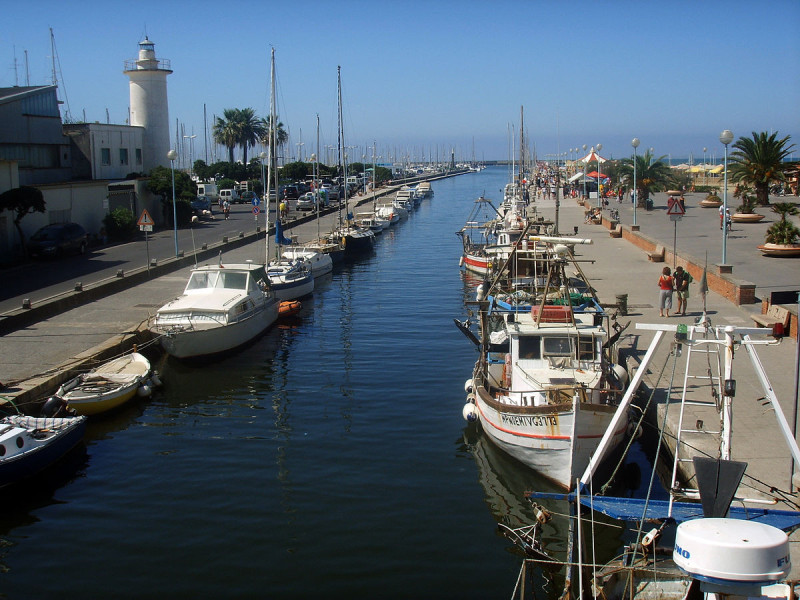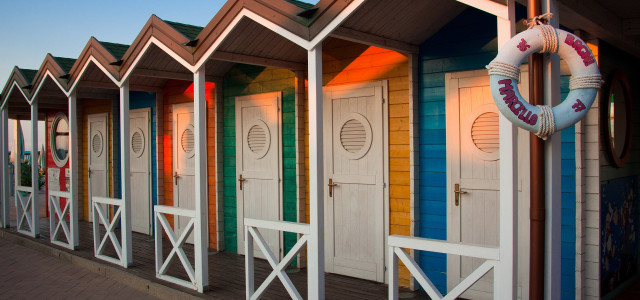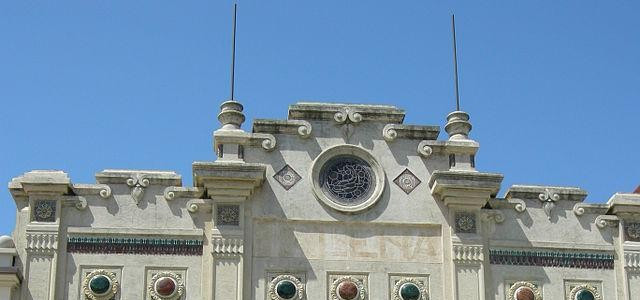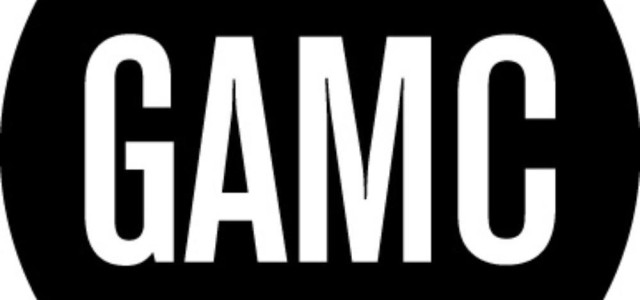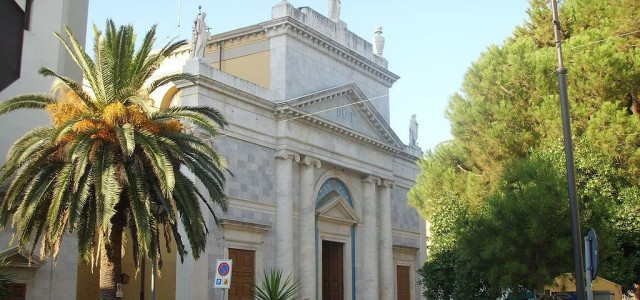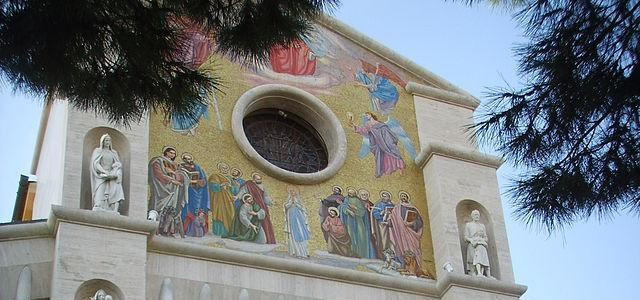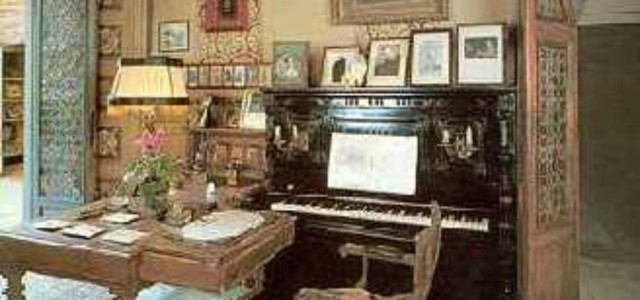Viareggio
Viareggio (Italian pronunciation: [viaˈreddʒo]) is a city and comune in northern Tuscany, Italy, on the coast of the Tyrrhenian Sea. With a population of over 64,000, it is the second largest city within the province of Lucca, after only Lucca city. It is known as a seaside resort as well as being the home of the famous carnival of Viareggio (dating back to 1873), and its papier-mâché floats, which (since 1925), parade along the promenade known as "Passeggiata a mare", in the weeks preceding Easter. The symbol of the carnival of Viareggio and its official mask is Burlamacco, designed and invented by Uberto Bonetti in 1930. The city traces its roots back to the first half of the 16th century when it became the only gate to the sea for the Republic of Lucca. The oldest building in Viareggio, known as Torre Matilde, dates back to this time and was built by the Lucchesi in 1541 as a defensive fortification to fight the constant menace of corsair incursions. Viareggio is also an active industrial and manufacturing centre; its shipbuilding industry has long been renowned around the world and its fishing and floricultural industries are still fundamental sectors to the city's economy. Viareggio hosts the Premio letterario Viareggio Répaci for literature, established in 1929. Amongst the other events organized around the year, it is worth mentioning the Festival Gaber, which has been held every August since 2004 to celebrate the memory of Giorgio Gaber, and is attended by several high-profile Italian musicians. Geography The entire area of Viareggio extends over the coastal flooding plain of Versilia. Located on the Ligurian Sea (although traditionally considered to face the Tyrrhenian Sea), it has 10 kilometres (6.2 mi) of sandy beaches, of which 6 kilometres (3.7 mi) are managed by private beach resorts and the remaining 4 kilometres (2.5 mi) are public (most of the public beach is part of the Parco Naturale Regionale Migliarino-San Rossore-Massaciuccoli. Viareggio borders the local municipalities of Camaiore, Massarosa and Vecchiano) (PI). The municipal area comprises the Lake of Massaciuccoli and several canals, the most important ones of which are known as Burlamacca, Farabola, Fossa dell'Abate (bordering the municipality of Camaiore), and Fosso Le Quindici. Climate The climate is characterised by high levels of humidity (between 60 and 80% of relative humidity in the summer months) and a yearly rainfall off 900 to 1,000 millimetres (35 to 39 in) as a result of the proximity of the Apuanian Alps to the coast. The main winds blow from the south-east, the Libeccio and the Ponente which batter the coast for two to three days in a row and cause severe storms. Average temperature: 21.5 °C (70.7 °F) Average high-temperature: 32 °C (90 °F) Average low-temperature: 11.0 °C (51.8 °F) Climatic classification: zone D, 1416 GR/G Atmospheric diffusivity: low, Ibimet CNR 2002 History Ancient and medieval ages During the 3rd century BC, the mountains of Versilia were slowly invaded by the Ligurian tribes who, coming from the north, stretched their area of influence as far south as the river Arno. In 180 BC the Romans defeated the Ligurians and started colonising the Versilia (the areas known today as Massaciuccoli, Camaiore, Pietrasanta). The most widely accepted theory recognises the city's name as deriving from the Latin Via Regis ("Kings' Road"), the name of the Medieval road linking the fortification built on the beach to Lucca. According to other historians, instead, the name derives from Vicus Regius. This theory is based on the fact that in imperial times, there was a small inhabited centre (vicus) in the area known as "Gli Ortacci" which belonged to the empire, hence regius ("Royal"). Several hillside towns started developing in the Middle Ages, several of which are still active. The area currently hosting the city of Viareggio, was still marshland and was not inhabited. Around 1000 A.D. started the first hostilities between Lucca and Pisa aimed at gaining control over the coast of the Versila which, since the High Middle Ages had been nothing more than a wood owned by feudal Lords in constant rivalry with each other. The first mention of Viareggio dates back to 1169 when a wooden tower guarding coast was built. A little over two years later, in (1172) a military building named Turris de Via Regia was erected, taking its name from the road that linked it to Lucca (known today as via Montramito). In the following years the area around Viareggio, was involved in the hostilities between Pisa and Lucca and in their attempt to gain control over the coastal area. The conflict was spurred by the desire of the Lucchesi to finally gain access to the sea, and to the Pisane fear of the economic competition of its rival city. It is during these years that the feudal Lords of Versilia were forced to abdicate in favour of Castruccio Castracani. In the following years the area upon which Viareggio would eventually be built was marked by a number of minor battles, invasions and pillages. In addition, the area was also affected by the pestilence which, recounted by Giovanni Boccaccio in his masterpiece the Decameron, spread throughout the whole of Italy. 15th through 17th centuries In these years Florence expanded its control over Tuscany. Lucca, however, managed to maintain its independence in exchange for hefty financial penalties. On September 10, 1513, Pope Leo X removed the port of Motrone from the control of Lucca. Such event will directly affect the future of Viareggio which, from that moment, became the focus of Lucca's efforts to turn the town into its centre for commercial activities, and, in addition to the square-plan tower erected in (1534) with the aim to protect the port, several settlements started appearing. The 17th century was perhaps one of the most difficult periods for the 300 inhabitants of Viareggio; the area was insalubrious, malaria and other deadly epidemic diseases made the lives of fishermen and farmers extremely difficult. Lucca, on the other hand, increased its efforts to drain the marshlands to improve quality of life and encouraged migration to the new town. Slowly Viareggio changed its appearance; two small churches and as many factories were built, followed by a number of small shops. Meanwhile its port became more active, while the cultivation of the drained fields started. 18th and 19th centuries In 1701 Viareggio became a comune (municipality). In 1739, thanks to the work of hydraulics engineer Bernardino Zendrini the marshlands were finally completely drained and the town turned into a place where noblemen from Lucca would come and build their palaces. In May 1799 Viareggio was the centre of a popular uprising against the Jacobins. With the invasion of Italy by Napoleon the Lucchese state was turned into a principality whose sovereignty was given to Felice Baciocchi, although the real power was in the hands of Napoleon's older sister, Elisa. Elisa's government was characterised by unpopular measures such as those against the ecclesiastic patrimony. Similarly, most of her financial policies were of dubious effect, although some were welcomed by the locals, such as the adoption of the "Napoleonic Code", the adoption of the metric system, the introduction of mandatory vaccination against smallpox. With the fall of Napoleon and Baciocchi, Viareggio was the centre of several acts of violence. In March 1814 the population openly protested against the French, an event which turned into acts of pure vandalism. Viareggio remained under the control of the Austrians until 1817 when, as part of the agreements from Congress of Vienna, Maria Luisa of Spain was assigned the new Duchy of Lucca. The years to come would wipe out any good action that had been taken during the Napoleonic rule, although the new ruler would contribute the town's expansion by building its first marina (seaside). In 1820 Viareggio obtained the status of city. Following the death of his mother (March 13, 1824), Charles Louis of Parma took over the government of Lucca and greatly contributed to Viareggio's expansion, by building a new church, a royal casino and two beach resorts, the first ones to be built in Viareggio. On October 5, 1847 Lucca was acquired by the Grand Duchy of Tuscany. Viareggio, in this new scenario, developed as a seaside resort for the whole of Tuscany. In 1848 the city adopted its current coat of arms. In these years Viareggio was the destination of many exiled intellectuals of the Italian Risorgimento who were tolerated by the local sovereigns. During these years Viareggio's economy saw a very rapid expansion through its already recognised beach tourism and the newly expanding sailboat industry. 20th century The beginning of the 20th century saw again a marked development of the coast and tourism industry which determined a drastic change to most of the beach. The Passeggiata or promenade was born, with its cafés and shops, contributing to turning the city into the "Pearl of the Tyrrhenian Sea". Wood was very widely used in most building and, in 1917, a large portion of the city was lost in fire in only one night. It was only during the fascist era that wood would finally be replaced by other materials. During World War II Viareggio was subject to heavy bombings and entire suburbs of the city were destroyed. After the war, the reconstruction could finally begin, but the city had changed its appearance dramatically. Today Viareggio is still a renowned seaside resort and is widely famous for its carnival and shipbuilding industry. 21st century Late in the evening of June 29, 2009, a train carrying liquified petroleum gas derailed while approaching Viareggio's railway station. The ensuing explosion killed 31 people, injured many others, and destroyed a large number of homes and families near the station. Main sights Villa Orlandi Villa Borbone (between Viareggio and Torre del Lago Puccini). Villa Puccini, Museum. Monument to the Resistance and to Peace, (largo Risorgimento). The monument is made of columns taken from the old City Hall, destroyed by the aerial bombardments of World War II, and two walls running perpendicular to each other. On one of these a mosaic from Folon can be found together with a quote from Quasimodo: "E come potevamo noi cantare con i piedi stranieri sopra il cuore?"/"And how could we sing with foreign feet trampling onto our hearts?" Transportation Viareggio can be reached by car from the A11 (Firenze-Mare) motorway, via the A11/"Bretella" Lucca-Viareggio link road or A12 (Genoa-Rosignano) motorway. Viareggio railway station is located near the city center, with 60 daily trains running along the Rome–Pisa–La Spezia–Genoa line, and the line to Florence, as well as international trains. The nearest airport is Pisa's "Galileo Galilei" international airport, just 20 kilometres (12 mi) south of Viareggio's city center. Florence's "Amerigo Vespucci" airport is 95 kilometres (59 mi) to the east. Port and marina Two extensions to today's Burlamacca canal were built in 1577. It is on its banks that the first maritime activities developed In 1740, Bernardino Zendrini had a water-gate built in order to prevent the sea water from arriving to lake Massaciuccoli. In 1820 Maria Luisa di Borbone, duchess of Lucca had the first marina of Viareggio built, which was completed in 1823, and took the name of Marina of Lucca. Between 1871 and 1873 the so-called Marina of Tuscany was built, then followed by the Marina of Italy, 1907 through to 1911. In 1938 the Marina of the Empire was also built, which was followed in the 1970s by the Marina of Viareggio (also known as the New Marina), the Marina of the Madonnina, and the new lighthouse. The Madonnina can host up to 500 vessels. The city hosts the local Capitaneria di Porto, and all vessels registered here bear the marking VG. Economy The primary sectors of Vieraggio's economy after tourism, commerce and services, include fishing and floriculture (the flowers of Versilia). The city also houses prolific shipyards. At the beginning of the 19th century the craftsmen from Viareggio used to build small fishing vessels along the banks of the Burlamacca canal. As the century moved on, however, this small shipbuilding activity prospered until it became an internationally acclaimed centre. Nowadays, this is a very important sector the city and the neighbouring communities. Culture Carnival The Carnival of Viareggio was established in 1873, while the now ever-present papier mâché – used to build the floats featured during its parades – was first introduced in 1925. The official masks of the Carnival are Burlamacco and Ondina, drawn for the first time in 1930. Since 1954, RAI broadcasts the entire event on national TV. Since 2001, the craftsmen of the carnival have moved to the Cittadella del Carnevale or, literally, Carnival Town. Prizes Premio letterario Viareggio Repaci, a literary award founded in 1929 by Leonida Rèpaci, Alberto Colantuoni and Carlo Salsa. Premio internazionale Artiglio. Premio Sport Città di Viareggio. Premio Viareggio Sport. Events Festival Puccini (held in Torre del Lago Puccini). It takes place every summer since 1930, between July and August, in an open-air theatre with 3,200 seats on the shore of lake Massaciuccoli. A new permanent theatre was opened in 2009. Jazz and more..., music festival held since 2002 Festival teatro canzone – Giorgio Gaber, since 2004 Viareggio Incontri, at "Il Principino", on the Promenade. EuropaCinema, an international film festival reserved to the European film industry. It has been founded in 1984 in Rimini, it was then moved to Bari in 1988, and finally to Viareggio in 1989. Sport The city is home of the roller hockey team CGC Viareggio. CGC Viareggio was the first club of Lucca province to be champion, in Italian sport. In 2011, got for the city the Lega Nazionale Hockey title. The association football team is F.C. Esperia Viareggio. Administrative subdivisions Viareggio has a single frazione, Torre del Lago Puccini, having a population of around 11,000. The city itself is subdivided into four Circoscrizioni: Circoscrizione no. 1: Torre del Lago Puccini. Circoscrizione no. 2: Centro Marco Polo. Circoscrizione no. 3: Darsena/ex Campo d'Aviazione. Circoscrizione no. 4: Viareggio Nuova. Coat of arms The current coat of arms was chosen in 1848 and replaces the previous one dating back to 1752, which showed an image of Saint Anthony from Padua, the first patron saint of the city. The current coat of arms consists of an anchor with a hawser placed on top of a white, red and green shield. Viareggio was one of the first municipalities to adopt the tricolore (later to become the official flag of the unified Italy) for its coat of arm; even before Italy was officially unified. International relations Viareggio is twinned with: Bastia, France Bridgeport, US Kunshan, People's Republic of China Opole, Poland Palmi, Italy San Benedetto del Tronto, Italy Pasto, Colombia People Inigo Campioni (1878–1944), soldier and politician Pierluigi Collina, football referee Marco Columbro, presenter and actor Eugenio Fascetti, football manager Marcello Lippi, football manager Nicola Luisotti, orchestra director Mario Monicelli, film director André Puccinelli, governor of Mato Grosso do Sul in Brazil Stefania Sandrelli, actress Percy Bysshe Shelley (1792–1822), English poet and writer who died here Mario Tobino (1910–1991), doctor, poet and writer. Maria Valtorta, writer and mystic* Eleonora Duse, actress in [1913] lived in a little rose villa behind a vineyard at Fossa Dell' Abata See also 2009 Viareggio derailment Carnival of Viareggio Festival Puccini Football Club Esperia Viareggio Premio letterario Viareggio Repaci Torneo Mondiale Giovanile di Calcio "Coppa Carnevale" Versilia References Sources History Bergamini, Francesco (1995). Le mille e una...notizia di vita viareggina 1169/1940. Viareggio: Pezzini Editore. Paolo Fornaciari (ed.). I quaderni del Centro Documentario Storico (Cenni di storia viareggina). __ (1994). I quaderni della torre. Viareggio: Pezzini Editore. Paolo Fornaciari (ed.). Quaderni di storia e cultura. Viareggio: Pezzini Editore. Del Carlo, Quinto. Ruggero Righini, ed. L'antica magione...storia preromana di Viareggio e Versilia. Edizioni Dedalus. Bergamini, Francesco (2000). Viareggio e la sua Storia 1000–1800. Viareggio: Pezzini Editore. Buildings Polleschi, Giorgio (1994). Le opere dell'ingegnere architetto Alfredo Belluomini. Viareggio: Edizioni della Fontana. Gravina, Luigi. Viareggio Illustrata. Viareggio: Arti Grafiche G. Pezzini. Religion Menchini, C.; G. Pratesi (1996). La Basilica di Sant'Andrea di Viareggio. Viareggio: Grafiche L'ancora. __ (1996). La Basilica di San Paolino. Viareggio: Grafiche L'ancora. __ (2004). Luoghi ebraici in Toscana. Settimo Milanese: Grafiche Mazzucchelli. Other Daniele Palchetti, ed. (2003). Viareggio. Milan: Idea Books. Isaliana Lazzerini, ed. (2003). D'incanto (attraverso Viareggio tra natura, storia, cultura e sogno). Florence: Maschietto Editore. External links Comune di Viareggio (English), the official website of the municipality of Viareggio Site with information about the city and a small dictionary about the local dialect (Italian) Site hosted by the "Carnevalari" Association, with news and historical information about Viareggio and its carnival (Italian) Viareggio (English), from the site www.aboutversilia.com Viareggio (English), from the site www.versilia.org Viareggio (English) from the holidaying site www.vacanzeinversilia.com [1] Viareggio Carnival (Italian), (English)
